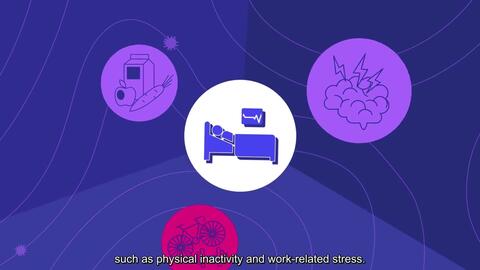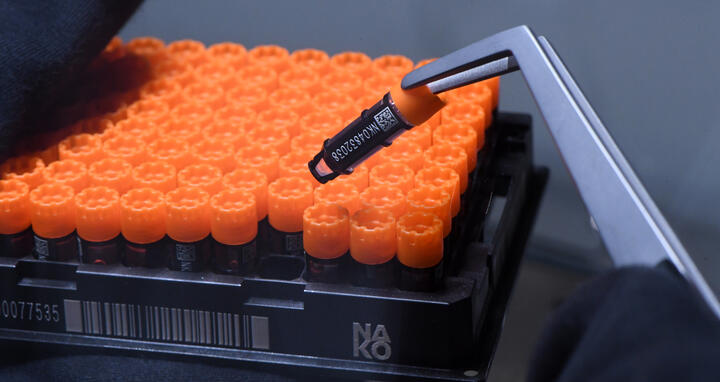Understanding the transition to disease
Chronic inflammation is the root cause of many organic diseases. Yet what happens at a molecular level in the body during this transition from health to illness is still largely unknown. With its project IMMEDIATE, a European team now wants to shed more light on these poorly understood processes and find out to what extent nutrition and the gut microbiome could be altered to prevent diseases from developing in the first place.
A total of 12 European institutions are participating in IMMEDIATE, which stands for “imminent disease prediction and prevention at the environment host interface.” The project coordinator is Professor Friedemann Paul, director of the Experimental and Clinical Research Center (ECRC) of the Max Delbrück Center and Charité – Universitätsmedizin Berlin, and professor at the NeuroCure Clinical Research Center at Charité.

The project will be funded for the next four years by the European Union’s Horizon Europe program to the tune of almost €7.2 million in total. A good €1.6 million of this will go to Charité; the Max Delbrück Center will receive around €1 million. The European Research and Project Office (EURICE) is also significantly involved in the planning and implementation of the large-scale project.
Searching for biomarkers
First, we want to better understand the inflammatory processes that precede organ dysfunction or damage.
“First, we want to better understand the inflammatory processes that precede organ dysfunction or damage,” Paul explains. “We also want to identify biomarkers that can be detected before disease symptoms even occur.” For their investigations, the researchers will employ methods including state-of-the-art omics technologies and make use of clinical data and biosamples from three ongoing observational studies. “These studies are the German National Cohort (NAKO), a cohort of patients who have received kidney transplants called KTx360°, and an Israeli cohort,” adds Dr. Chotima Böttcher from the ECRC, who is helping to coordinate IMMEDIATE.
Professor Tobias Pischon’s Molecular Epidemiology Lab at the Max Delbrück Center is playing a key role in the search for biomarkers. “We will use a proteomic approach to measure a variety of inflammation markers,” says Pischon. “Since we are mainly interested in disease precursors, we want to identify molecular signatures associated with changes in cardiovascular and renal function as well as metabolism.” His team will then investigate the similarities and differences between these signatures in different diseases.
An inflammation-reducing microbe
Further steps are planned parallel to these investigations: “The main goal of the project is to understand how and why interventions such as dietary changes and the administration of special microbiota change the composition of the gut microbiome – and how the metabolic products of the microbes influence the immune system,” explains Dr. Sofia Forslund, head of the Host-Microbiome Factors in Cardiovascular Disease Lab at the Max Delbrück Center and ECRC.
The hope, Forslund says, is that this knowledge can then be used to prevent disease and promote health. Her team will be primarily responsible for developing the necessary infrastructure and analytical methods to pull together the huge amounts of data generated by omics technologies and evaluate these data with the help of artificial intelligence. The other participating teams on Campus Berlin-Buch are Dr. Philipp Mertins’ Proteomics Lab, Dr. Jennifer Kirwan’s Metabolomics Lab, Dr. Nicola Wilck’s Immune-Microbial Dynamics in Cardiorenal Disease Lab, and Dr. Anja Mähler’s Clinical Research Unit.
The IMMEDIATE consortium is also planning its own intervention studies, including a study with around 200 hospital workers. “These test subjects are often under a great deal of stress due to their job and usually eat rather unhealthily and at irregular times,” explains Böttcher. “So we assume that they will have elevated inflammation levels.” One thing the researchers want to find out is whether the administration of the anti-inflammatory microbe Akkermansia muciniphila can change the biomarkers of the test subjects and improve their general well-being.
Support from apps
Mobile apps developed by the IMMEDIATE team in cooperation with patient advocacy organizations will help them gather information in this study. “For example, the test subjects can enter how stressful their day was, as well as when and what they ate,” explains Böttcher. The apps also provide feedback and tips to help the users integrate proven health-promoting measures into their own lives – enabling changes to be made before they even reach the disease threshold.
Text: Anke Brodmerkel
IMMEDIATE wird am 1. Januar 2023 starten und hat eine Laufzeit von vier Jahren.
Grant Agreement No.: 101095540.
Further information
- Experimental and Clinical Research Center
- Friedemann Paul Lab – Clinical Neuroimmunology
- NAKO health study
- Sofia Forslund – How the heart and gut are connected
- Anja Mähler – In charge of the chambers





